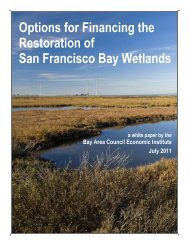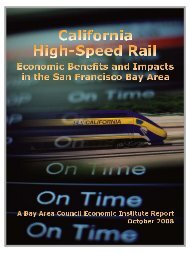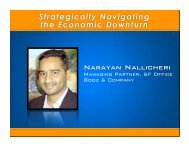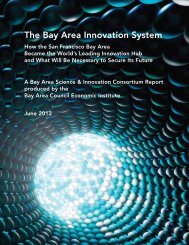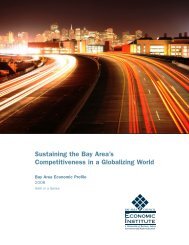Ties That Bind - Bay Area Council Economic Institute
Ties That Bind - Bay Area Council Economic Institute
Ties That Bind - Bay Area Council Economic Institute
Create successful ePaper yourself
Turn your PDF publications into a flip-book with our unique Google optimized e-Paper software.
4<br />
<strong>Ties</strong> <strong>That</strong> <strong>Bind</strong><br />
goal. Of the balance, some companies produce for a mix of Chinese and global markets, while<br />
only 10% are in China to take advantage of a lower cost structure and sell back to the U.S. For<br />
many of those, the lower cost of having a China operation helps them remain competitive and<br />
sustain jobs in the U.S.<br />
Doing business in China is not without challenges. For many foreign firms operating in China,<br />
regulation (bureaucracy and lack of transparency) has been a problem. Despite its market elements,<br />
the role of government in the economy remains pervasive. Competition among foreign<br />
and domestic firms has intensified, increasing price pressure and eroding margins. Other challenges<br />
include intellectual property rights (IPR) infringement, and growing difficulty in finding<br />
and retaining qualified local managers. In major cities, local pay packages are now approaching<br />
expatriate rates, and in some industries employee poaching is common. As personnel and real<br />
estate costs in coastal areas and major cities such as Beijing and Shanghai rise, more U.S. companies<br />
seek opportunities in second-tier cities in China’s interior. This brings new challenges in logistics<br />
and staffing, and even weaker IPR enforcement than in Beijing or Shanghai, where central<br />
government influence is stronger.<br />
Despite its breakneck growth, China faces economic challenges of its own. Energy shortages<br />
and poor transmission infrastructure produce routine power outages, and a heavy reliance on<br />
coal-fired generating plants has degraded air quality nationwide. Compounding its severe environmental<br />
problems, the nation faces looming issues of water quality and availability, in its<br />
urban areas.<br />
Billions of dollars in savings deposits with major banks are tied up in loans to poorly performing<br />
state-owned companies. Linkage of the yuan to a basket of currencies instead of the dollar in July<br />
2005 has resulted in an expected 4% appreciation by yearend 2006, but the currency is believed<br />
to be undervalued by at least 20%. Many economists argue that the size of China’s economy, its<br />
per capital income and other indicators should be stated on a purchasing power parity (PPP) basis,.<br />
Using PPP as a measure, China’s economy increases from $2.2 trillion to nearly $8.2 trillion,<br />
according to U.S. State Department estimates—larger than that of Japan and second only to the<br />
U.S. Annual per capita income is restated as $6,210.<br />
An estimated 87,000 pubic protests or disturbances occurred across China in 2005, many linked<br />
to corruption or to local and provincial government appropriation of rural land for development.<br />
It has been estimated that China must generate 200 million new jobs over the next 20 years simply<br />
to absorb displaced rural workers and families moving to Chinese cities, and to reduce the<br />
gap between rural and urban wages. This will in turn require a minimum 8% annual GDP<br />
growth, and a new rural development model to improve the lives of some 800 million remaining<br />
rural residents. Cities will not be able to accommodate them and, with only 15% of China’s land<br />
arable, traditional farming will not offer a full answer either.<br />
Finally, security concerns over China’s ongoing military buildup, its weapons exports, and its<br />
uneven enforcement of intellectual property protection inhibit the more advanced technology<br />
transfer that China seeks. While foreign companies are increasingly monitoring the workplace



